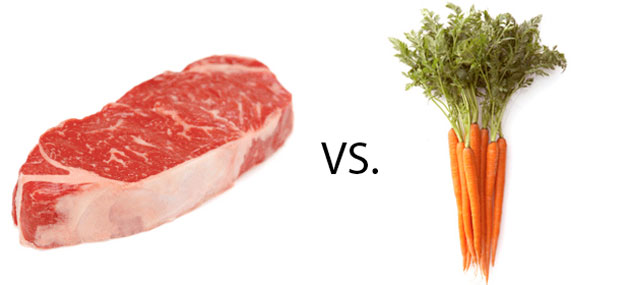|
When I see patients that have been trying to take care of themselves, many of them will boast that they are Vegetarian, Vegan, or "non-red-meat" eaters. Sometimes my patients will even ask if it's healthier to be on a "meatless" diet. Although there is plenty of research that indicates eating a vegetarian/vegan diet is healthier, I personally do not recommend this for most people.
There are many biblical based diets, such as the "Hallelujah diet", the "Daniel Diet", and just the plain vegetarian lifestyle, and I hear many people refer to this healthier way of eating as "God-ordained". This is where my skepticism comes into play. Does the bible ever forbid us from eating meat? Absolutely not! Yes, the Jews were told to not eat cud-chewing or two-hoofed animals, or fish without scales or fins (Lev. 11:3-10). (These prohibitions were later nullified in the new testament in Acts 10:15 and Col. 2:16) But even though we see Daniel and his three wise friends asking to be allowed to eat a vegetarian diet, this is very analogous to the results we see in research today that justifies a meatless diet. (More on this later.) Nebuchadnezzar wanted his wise men to be fed with the king's meat and wine for three years, learn the new language of their captors, and then be brought before King Nebuchadnezzar. Daniel requested not to be "defiled" with this food, and asked to only be given vegetables and water. We're not told the specifics of the king's food, but it was very likely rich with sauces, breads and other delicacies, along with the meat and wine. After 10 days, Daniel and his friends looked healthier than the others the king was feeding his diet to, so many have insisted that this meatless diet was what God had intended for a healthy diet to consist of. But there are too many other instances where God actually gives the Israelites meat to eat - starting back in the garden of Eden. Able was a herdsman, and offered up a burnt sacrifice (of meat and fat) to the Lord. How would he even know how to do this if he wasn't eating it himself, as well as the others? God also commanded the Israelites to eat lamb during the Passover before they left Egypt, and then again provided quail for them in the wilderness. Would God provide something for His children, and even encourage them to eat it if it wasn't healthy? And why would He have designed us to be able to digest meat, as well as vegetables if we weren't intended to eat it? So here's the problem with jumping to conclusions without having ALL the facts: We don't know why Daniel insisted that the king's foods would defile him - but there was obviously something in that diet that altered the complexion and made the people unhealthier looking than vegetables and water. Could it have been the sauces, breads and wine that caused that effect? We just don't know. (Unless Nebuchadnezzar's meats included pork and crustaceans.) And even today, when we know that gluten (breads and pasta) are detrimental to many peoples health - Jesus ate bread, and even gave it to others! Doesn't that prove that just because people were allowed or encouraged to eat it thousands of years ago doesn't mean that it's healthy? Consider this: The bread they ate 2,000 and plus years ago were first of all sun-baked - not oven baked at high temperatures. (This alters the wheat, making it even more difficult to digest.) And today, due to hybrids, the gluten content of wheat has increased substantially (because food corporations LIKE the texture it provides, and encourage farmers to use high-gluten seed for growing grains). On top of that, gluten is typically added to breads and pastas which causes intestinal problems with many people, and even provokes auto-immune disease. (That's to say nothing of the glyphosate they saturate it with!) My point is that our food has changed today. So we don't want to judge something as being bad for our health based on the foods people ate back in biblical times (or if you believe in evolution - the caveman diet). Our food is now processed, has many additives, hormones, antibiotics, chemicals and things that are NOT good for us. Therefore, when studies are done on vegetarians vs meat-eaters, we have to ask ourselves: "Did they eat grass-fed beef, wild caught fish, and organic range-free chicken, or did they feast on McDonald's and Long John Silver's diets that are filled with additives, oils, hormones and antibiotics known to be bad for our health?" And how can you compare a Seventh Day Adventist with someone eating the Standard American Diet, where their faith requires them to be free from smoking and alcohol, maintaining healthy lifestyles and even exercising regularly? People who are Vegetarians/Vegans are typically people more concerned about their health, and do many other beneficial things for themselves, other than just avoiding meat in their diets. Dr. Mark Hyman just did an interview with Chris Kressor that talks about the erroneous conclusions that many dieticians and doctors are coming to, based on inadequate clinical trials that have compared meat eaters with non-meat eaters. If you are interested in watching it, here is the link. https://www.youtube.com/watch?v=2RSUVTmRU0M&mc_cid=6e97675827&mc_eid=aca97ba2c1 The bottom line is this: If you like meat, you can eat it in moderation - but avoid the antibiotic and hormone-fed animals. Yes, organic meat (and wild-caught fish) costs more...but isn't your health worth it? (Especially if you still get to eat something you truly enjoy!) Wishing you Abundant Health, Dr. Filippini
0 Comments
Something I've taken notice in my elderly patients as they cross that 60's milestone (including myself), these folks have given up on the grandiose idea of ever looking or feeling like they did in their 20's or 30's. If they haven't attained their high school weight, if they're suffering with chronic disease, aches and pains...and even life threatening illness - their goal changes from looking and feeling young again to that more in lines of preserving what they have left.
But even at later stages in life, when people are willing to make some strategic lifestyle changes, begin exercising regularly, detox the hundreds of toxins they've accumulated in their bodies through the years...and yes - even change their diet, life can be much better. But there is a positive note to growing older. (And I believe this far outweighs all the deterioration that's going on in the body.) That's the changing outlook on life. In our younger years, life's pursuits tend to be focused on material gains: Having a nice house, a fancy new car, all the latest gadgets...even saving up for a long and comfortable retirement. As we get older, that focus begins to change to preserving our health, for one - to be able to enjoy the activities that we CAN perform, and be around for our kids and grand kids. But as II Cor. 4:16 states: "For we do not lose heart. For although our outer man is decaying, yet our inner man is being renewed day by day". If we let Him, God is preparing us for transition from this temporal and decaying world to one of an eternal one...with new bodies that never grow old or get sick. These fading material things become less and less important, and the things that are truly of lasting importance (such as relationships, loving, giving, and growing closer to God) become our main focus in life. What's truly amazing is that as we focus on the important, and less on the trivial and fading things of life, we begin to enjoy all these things all the more...including better health. It's too bad we can't all learn this lesson earlier in life! "Seek first the kingdom of God, and His righteousness, and all these things shall be added unto you." (Mt. 6:33) Wishing you abundant health (and life), Dr. Filippini |
Dr. FilippiniFounder of Abundant Life Health & Wellness, a functional medicine clinic located in Danville, CA. Archives
March 2020
Categories |


 RSS Feed
RSS Feed